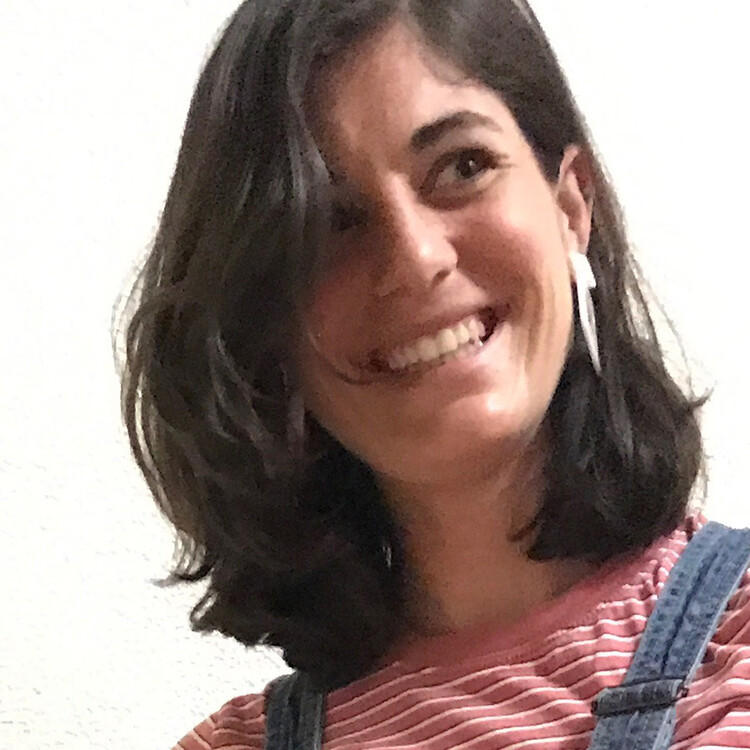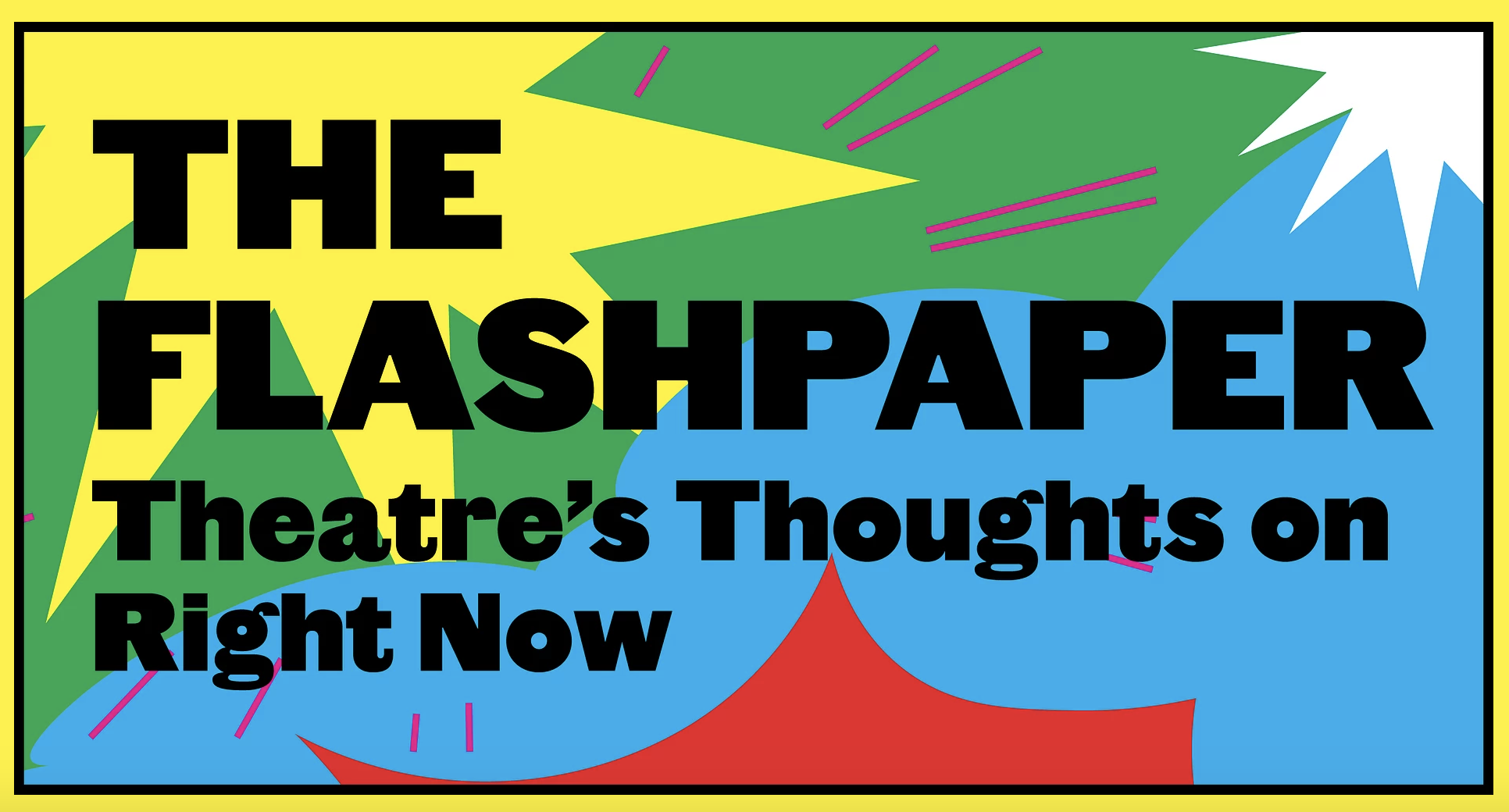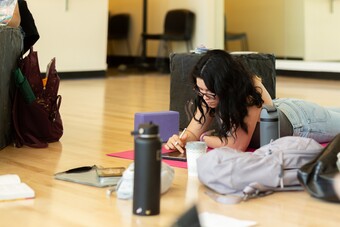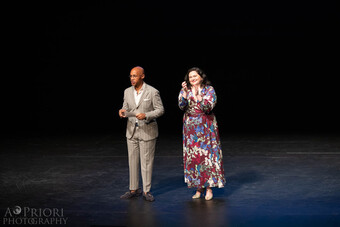The initiative is a reminder that despite how we might be perceived, nonprofits are not the emblem of some greater good. Our existence indicates problems. And the Lark’s specific existence indicates that theatre has a commodification problem. We work as an alternative space that rejects the commercial nature of the field, in part because of the limited scope of perspective its model engenders. If theatres could actually become inclusive, if that were the culture, then we wouldn’t need to counter it. That would feel like justice.
Of course, that would also mean we stopped existing. It would not necessarily mean the community we’ve built would stop existing, but it would be the end of us as an institution. For the sake of argument, we’re willing to follow that thread and hypothetically put ourselves out of business. We humbly offer these thoughts on how the industry at large might treat writers more justly, and thus solve the problem our mission was created to address.
What if the missions we set were not simply guidelines, but things we could actually accomplish?
First, we need to address the cognitive dissonance that exists in the arts sector. It’s caused by organizations that claim to support art because of the impact it has on society, but actually support art because it makes money. Because doing so is their livelihood. This—dare we call it—gaslighting is emboldened by the attitude that anyone who pursues a career in the arts does so out of passion. It has become easy to say that no one goes into the American theatre for the money, but it’s not entirely true. Too often, plays are seen by producing theatres as marketable merchandise, and playwrights are seen as manufacturers. Notes are given based on what might be easier to sell, not on what best conveys the specific truth of a play.
Combatting this structure can happen in a variety of ways. For us, it means offering different pathways to and models of success that aren’t determined solely by ticket sales and critics’ picks, which are emblematic of oppressive systems of capitalism, patriarchy, and white supremacy culture. The more those pathways and models emerge, the closer the “initiative” gets to its curtain call. People, not just their output, need to be nourished if we expect them to do the vulnerable work of playwriting, which is part of the reason the Lark places such an emphasis on the importance of process.
Process necessitates vulnerability. Sharing something before it’s done, allowing others to bear witness to something you’re unsure of, and to you being unsure, is not easy. This work is deeply personal, and it calls for an artist to offer large parts of who they are. Entering into a room to workshop your pages can feel dangerous for a number of reasons. But it is essential that a fear of failure is never something that stops a writer from making that entrance.
In the spirit of centering the voices of playwrights, we can’t really say it any better than Kimber Lee (Untitled F*ck M*ss S**gon Play, to the yellow house) already did:
It feels like there are very few places where genuine risk is truly encouraged and supported, though it is fundamentally necessary for meaningful growth beyond what we are now. Thank goodness for the ways that gently leveraged time constraints and a gathering of other playwrights can make a space for taking a terrifying running leap, and falling splat, but drawing courage from the room to take another, and another, and another. It builds muscle.
Kimber’s metaphor is right on (it’s almost like she’s a writer or something) in that muscles build in their recovery process. But that process, like any other, needs to be nourished in order to work. Writers must feel that they can bring in their pages and fall face-first. That failure is progress. That failure is discovery. That failure and success are actually part of the same whole. And most importantly, writers must be able to enter into rooms knowing those rooms are genuinely interested and invested in their unique visions of the world—that they can write dangerously and fearlessly and critically.
They must be able to do this because, as it happens, the cliché language about the “necessity of art,” which shows up in so many mission statements is, in fact, true.
Despite how we might be perceived, nonprofits are not the emblem of some greater good. Our existence indicates problems.
Theatre is uniquely positioned to engender the kinds of empathy that are vital to reimagining our present and to working towards a better future. Yet when producers are presented with works that challenge their own worldviews or the norms of their “audience” (in quotes because of how erroneously synonymous this is with white audience members), their fragility acts as a gatekeeper to the realization of the revolutionary potential of plays.
As it stands, failure and risk are not encouraged by our field. In fact, the same precarity of budget that leads people to say “no one goes into the arts for the money” is exactly the thing that causes producers to base decisions on what will most easily or assuredly make money. This paradox is what gave rise to the need for the kind of safe space the Lark aims to foster. But if the field transformed, if there wasn’t a need for a safe space away from the norms of the industry because the industry itself was truly safe, that would be an infinitely better situation. Writers must have the freedom to practice being the world-builders they are, because we need to build a new world.
As it stands, the opportunity to fail is afforded to the privileged alone. To artists who have already “proven themselves” to be able to sell tickets. (Again, as though it’s the playwrights, not marketing departments, doing the selling).
In a posthumously published essay in American Theatre, artist and producer Diane Rodriguez wrote:
Realistically, if that “greater good principle” is not fervently adhered to, one must wonder why both the philanthropic and the nonprofit arts and culture sector can withhold millions of dollars of taxes from the overall societal “greater good” without delivering services to all communities—not just those of privilege.
When the theatre calls for new voices; a diversity of perspectives, stories, and experiences; and challenging works, yet fails to actually support the artists who live this call, it exposes the tokenization of diversity rather than a true cultural shift in the field. When artists are met with defensiveness or false support, they are not able to do the world-building that we so desperately need. When their voices are constrained out of fear and fragility, it has severe repercussions for our culture. When only those who are financial stakeholders in art are determining which pieces are “allowed,” the gatekeepers not only are oppressing artists as individuals, but also are shaping the cultural narratives of our time in a way that erases all experiences, identities, and perspectives that do not align with their own.
Justice in theatre looks like divorcing from capitalist-driven models that feed the culture of celebrity and the singular voice. It looks like moving to a theatre ecology in which organizations of all sizes and missions exist for and are truly accountable to the people they serve. In this ecology artists aren’t asked to write pseudo–entry points for a (white) audience. They are truly trusted to tell their own stories. They are acknowledged as experts in their own experiences, and they are supported to be the leaders they are.
Justice in theatre looks like divorcing from capitalist-driven models that feed the culture of celebrity and the singular voice.
It is no longer (and has never been) enough for nonprofits to have missions. We need to live up to them. Nonprofits, not unlike our government, claim to be in service to people and to communities, but it’s no secret that we can fall short, especially when we are still beholden to the systems of funding that perpetuate the problems we aim to solve. In fact, let’s just call it telling that even publishing the phrase “not unlike our government” was a question mark as this essay was written, since as an organization that receives government funding, criticisms like that can get dicey. Justice would look like that not being true. It is completely contradictory that nonprofits are not legally allowed to participate in politics, when those exact politics are driving the inequities nonprofits are founded to address. Justice would look like an untangling of this knotted structure that keeps us so strongly tied to the status quo.
In the simplest terms, justice would look like public service systems serving the public, instead of really just serving themselves. It would look like those systems answering to the public, instead of answering to whomever happens to be at the top of their internal, hierarchical structures. It would look like, oh, we don’t know, let’s say, the mayor/governor/president answering to the people they’re supposed to work for. And nonprofit theatres that claim to be artistic homes answering to the artists they’re supposed to work for.
The way we respond as a field to the We See You White American Theatre demands, for example, will be telling. Will nonprofits continue to see themselves as having the power to agree or disagree with what is laid out in that document? Or will they recognize that the fact that document was written demonstrates that the power lies with the artists, and that they are claiming it? The days of playwrights being grateful to theatres for producing their work must be put behind us. And the days of theatres being grateful that playwrights are allowing them to be part of their art must be ushered in. And when that happens, when it becomes the standard that artists are truly trusted and listened to, then the initiative, the Lark, can be happily ushered out.











Comments
The article is just the start of the conversation—we want to know what you think about this subject, too! HowlRound is a space for knowledge-sharing, and we welcome spirited, thoughtful, and on-topic dialogue. Find our full comments policy here